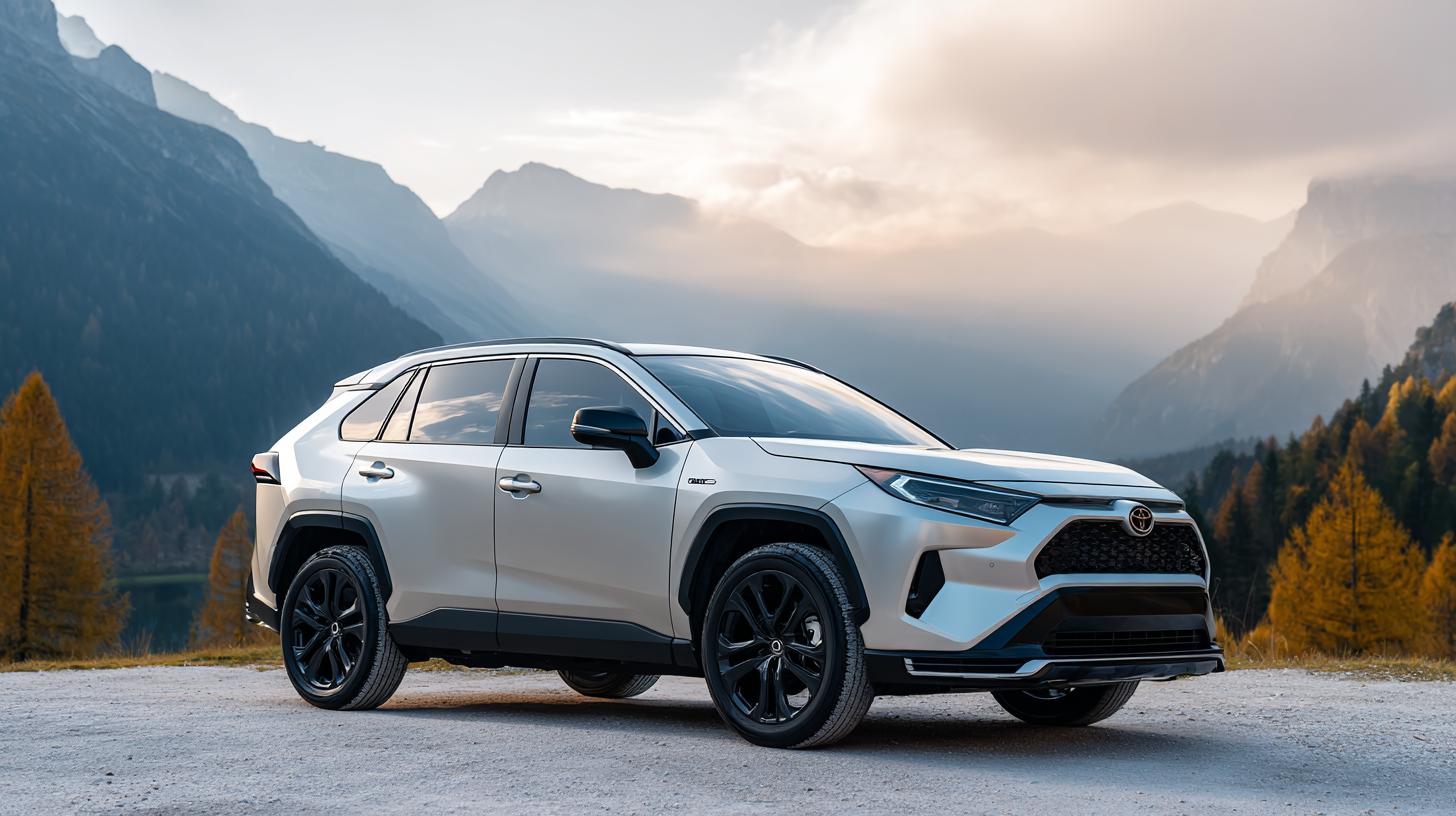As modern drivers increasingly seek eco-friendly alternatives without compromising on performance or convenience, the Plug In Hybrid SUV has emerged as an appealing solution. This innovative vehicle type combines the efficiency of electric power with the versatility of traditional fuel, providing a seamless driving experience.

In this guide, we will explore the myriad benefits of owning a Plug In Hybrid SUV, from reduced carbon emissions and lower fuel costs to the flexibility of an extended driving range. Furthermore, we will delve into how these vehicles cater to the demands of contemporary lifestyles, providing a perfect balance between sustainability and practicality.
Whether you're a city commuter or an adventurous road-tripper, understanding the advantages of Plug In Hybrid SUVs can help you make an informed decision that aligns with both your values and driving needs.
Owning a plug-in hybrid SUV offers modern drivers significant advantages, particularly in terms of fuel efficiency and cost savings. According to the U.S. Department of Energy, plug-in hybrid vehicles (PHEVs) typically offer an average fuel economy of 50 MPG combined in city and highway driving conditions when accounting for both electric and gasoline usage. This enhanced efficiency can lead to substantial savings on fuel costs, allowing drivers to reduce their annual fuel expenditures by up to $1,000 compared to conventional gasoline-powered SUVs, depending on driving habits and local fuel prices.
Additionally, plug-in hybrid SUVs often qualify for various government incentives that can further lower ownership costs. For instance, many PHEVs are eligible for federal tax credits up to $7,500, as outlined by the IRS. Furthermore, state-level programs and incentives may also provide rebates or tax breaks, increasing the overall cost-effectiveness of these vehicles. With rising fuel prices and a growing emphasis on eco-friendly alternatives, owning a plug-in hybrid SUV not only supports a sustainable lifestyle but also represents a smart financial decision for modern drivers seeking to maximize their resources.
This bar chart illustrates the fuel efficiency (in miles per gallon) of various Plug-In Hybrid SUVs. The data highlights the cost savings potential for modern drivers, emphasizing the benefits of choosing a plug-in hybrid vehicle over traditional gasoline-powered SUVs.
The rise of plug-in hybrid SUVs reflects a growing awareness of environmental concerns among modern drivers. One of the most significant benefits of hybrid technology is the reduction in emissions compared to traditional gasoline vehicles. By utilizing both an electric motor and a gasoline engine, these vehicles can operate in electric-only mode for shorter trips, which significantly curtails the release of harmful pollutants. This dual capability not only contributes to cleaner air but also helps in reducing greenhouse gas emissions, addressing climate change effectively.

Moreover, plug-in hybrid SUVs often come equipped with advanced regenerative braking systems. This technology captures and redirects energy that would otherwise be lost during braking, further enhancing efficiency. As a result, drivers can enjoy extended driving ranges with reduced reliance on fossil fuels. By opting for hybrid vehicles, modern drivers not only benefit from lower fuel costs but also play a pivotal role in fostering sustainable transportation solutions that protect the environment for future generations.
Owning a plug-in hybrid SUV (PHEV) not only offers exceptional fuel efficiency and reduced emissions but also comes with a range of enticing government incentives that make it a financially savvy choice for modern drivers. According to the U.S. Department of Energy, purchasers of new plug-in hybrids may qualify for a federal tax credit of up to $7,500, depending on the battery capacity and the manufacturer's sales volume. This significant financial incentive can effectively lower the initial cost of the vehicle, making it more accessible for consumers.
Additionally, many states offer their own rebates and incentives, further sweetening the deal for PHEV owners. For example, as highlighted in a report by the International Council on Clean Transportation, several states provide tax incentives, carpool lane access, and reduced registration fees for plug-in hybrid vehicles, enhancing their appeal. These local incentives can range from several hundred to several thousand dollars, depending on the state and specific programs available. Ultimately, these financial benefits make owning a plug-in hybrid SUV an attractive option for environmentally conscious drivers seeking both economic and ecological advantages.
 The driving experience of hybrid SUVs offers a unique blend of versatility and performance that modern drivers truly appreciate. These vehicles combine the best of both worlds, allowing you to engage in environmentally friendly driving while still enjoying the power and comfort of larger SUVs. With their advanced technology, hybrid SUVs can seamlessly switch between electric and gasoline power, providing smooth acceleration and a significantly reduced carbon footprint.
The driving experience of hybrid SUVs offers a unique blend of versatility and performance that modern drivers truly appreciate. These vehicles combine the best of both worlds, allowing you to engage in environmentally friendly driving while still enjoying the power and comfort of larger SUVs. With their advanced technology, hybrid SUVs can seamlessly switch between electric and gasoline power, providing smooth acceleration and a significantly reduced carbon footprint.
Tips: When considering a plug-in hybrid SUV, pay attention to the battery range and charging options available. A greater electric range means less reliance on gasoline, maximizing fuel efficiency. It’s also wise to test drive multiple models to find one that suits your comfort and performance preferences, ensuring you experience the best the market has to offer.
Moreover, hybrid SUVs are often equipped with advanced safety features and spacious interiors, making them ideal for families and long trips. They offer ample cargo space and the capability to tackle various terrains, which is perfect for those who lead an adventurous lifestyle. With the right hybrid SUV, drivers can enjoy a versatile vehicle that adapts to their needs, merging functionality with eco-conscious driving.
Tips: Always consider the maintenance costs associated with hybrid vehicles, as they can differ from traditional SUVs. Keeping an eye on the battery’s health and utilizing manufacturer services can enhance longevity and performance.
One of the primary advantages of owning a plug-in hybrid SUV is the flexibility it offers in charging convenience. Modern drivers can easily charge their vehicles at home, which provides a significant advantage over traditional fuel station dependency. With a dedicated charging station installed in the garage, drivers can begin each day with a full battery, effectively starting their day without the need to visit a gas station. This not only saves time but also allows for smarter energy management, as drivers can take advantage of lower electricity rates during off-peak hours.
In contrast to relying solely on fuel stations, which can be limited and inconvenient, a plug-in hybrid SUV empowers drivers to combine electric and gasoline power as needed. This dual capability ensures that even during long trips, drivers aren’t at the mercy of charging infrastructure availability. The ability to seamlessly switch to gasoline when necessary alleviates concerns about range anxiety while still enjoying the benefits of electric driving in daily commutes. This hybrid approach provides optimal convenience, aligning with the lifestyle of modern drivers who seek efficiency and flexibility in their vehicles.
| Charging Method | Convenience Level | Cost per Charge | Average Charging Time | Environmental Impact |
|---|---|---|---|---|
| Home Charging | High | $1.50 per full charge | 4-6 hours | Lower emissions - renewable energy compatible |
| Public Charging Stations | Medium | $4.00 per full charge | 30 minutes to 1 hour | Varies - dependent on electricity source |
| Fuel Stations | Low | $3.00 - $4.00 per gallon | 5 minutes | Higher emissions |
